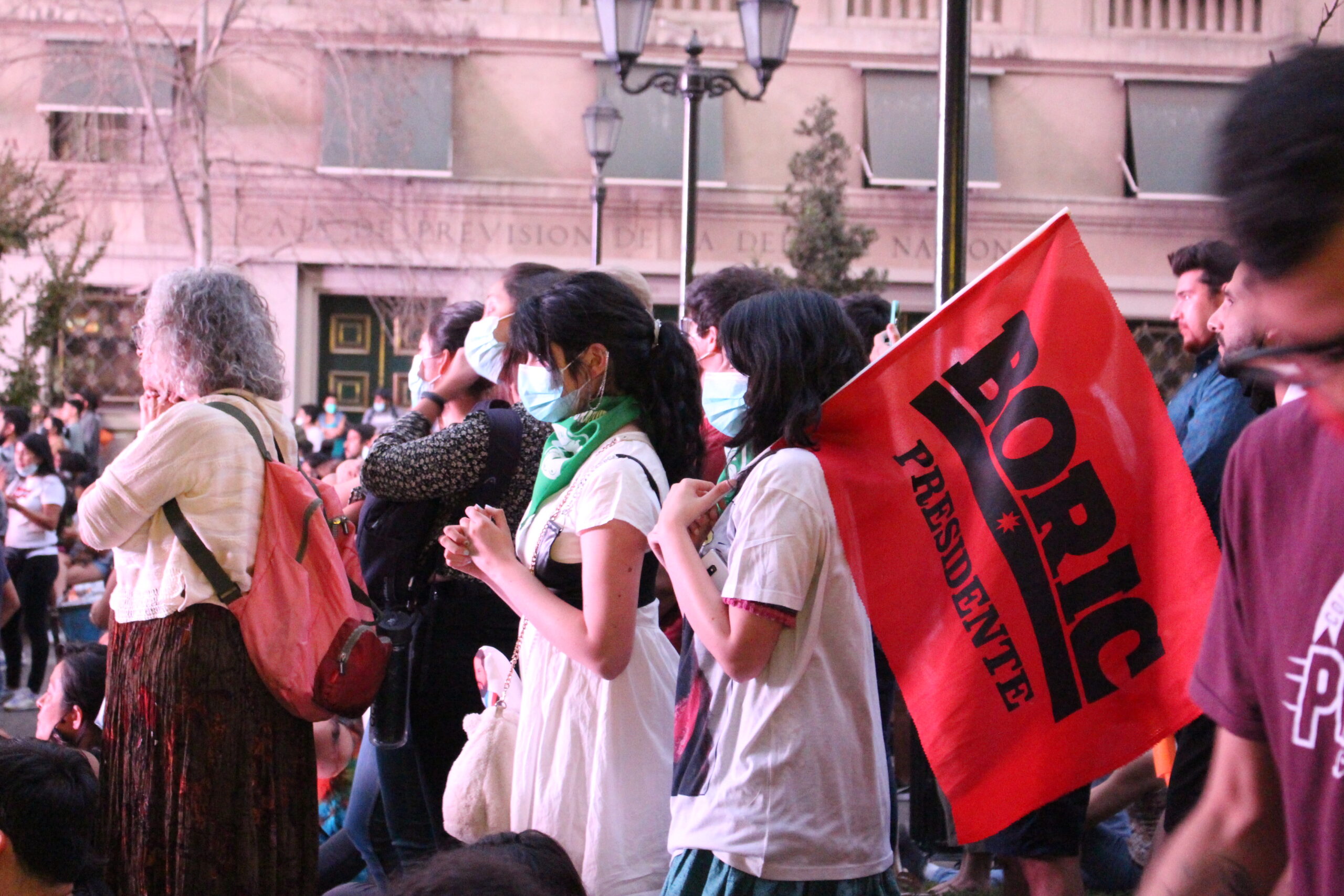
Gathering to hear Boric’s speech on the eve of his inauguration, Paseo Bulnes in Santiago de Chile, 11 March 2022 / Emilie Tant
‘The people are with you’: With new president Gabriel Boric, real hope returns to Chile
Gathering for the inauguration of Chile's new left-wing president, people share their thoughts with gal-dem.
Emilie Tant
15 Mar 2022
On Friday 11 March, Gabriel Boric was sworn in as the most voted-for president of Chile, after a colossal victory in a December election runoff against far-right candidate Antonio Kast. Now a figure representing hope, embodying the much-needed change to the country’s leadership, he brings alongside him a majority-women cabinet that will be the first to appoint LGBTQI+ ministers.
Many are fellow student activists, feminists and union leaders born out of a decade of intense youth resistance. They come from what Chileans call the generation sin miedo (without fear); those who ignited the mass social movements laying the path to Boric’s presidency.
This lack of fear and ardent desire for change climaxed in the social uprising of 2019, which saw middle-school students jumping the metro barriers in Santiago to protest rising ticket prices. The estallido social (social uprising) that followed converged over a diverse program of demands against inequality that had been building in the streets since 2011.
It has been a long and arduous road for the country’s radical youth fighting for a new society and against police violence. The wave of protests two years ago saw the deaths of at least 23 people, and police detained 28,000 protesters, blinded or caused severe eye trauma to at least 445 people, and provoked a wave of accusations of human rights violations and sexual violence abuses.
“It has been a long and arduous road for the country’s radical youth fighting for a new society and against police violence”
A mere two years later, it is huge that Antonia Orellana, a feminist movement leader who stands for free, legal and safe abortion in a country where this healthcare is criminalised, holds the Ministry of Women and Gender Equality. Mapuche women like Elisa Loncon and Ericka Ñanco are now elected representatives, leading political processes and indigenous people’s participation in the new government and constitution.
So what do these young, women and LGBTQI+ dissidents who live in Chile feel? On the eve of Boric’s inauguration, after decades and years of fighting, mobilising and protesting, has hope finally returned to Chile?
Natalia
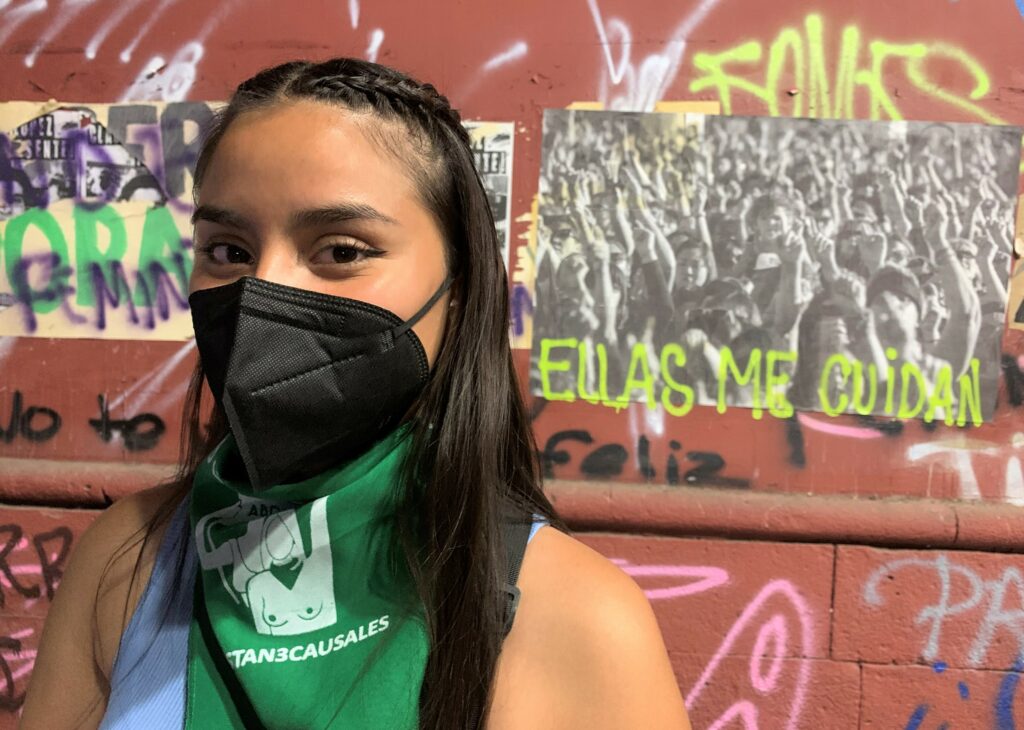
Natalia, a 20-year-old university student involved in feminist organising, spoke from the perspective of the many young women who have claimed feminism as a political identity in Chile.
“It gives me so much hope, truly. In my heart, I have a flame, a fire that burns. I am super hopeful for the future, for everybody,” she tells gal-dem. “Obviously, it gives me great hope that [the government] is going to be feminist… that they’re going to incorprate everyone into the spaces of power: from the neighbourhoods and social movements, the women, the dissidents, the working class women too.”
“In my heart, I have a flame, a fire that burns. I am super hopeful for the future, for everybody”
Natalia
“The feminist movement and social uprising made visible to us the many fights that were not seen before, those that were much more under the radar. Now, you notice everything so much more.”
Chile isn’t just going through one political process. For over a year independently elected representatives from all over the country have been debating the principles of a new constitution. Natalia hopes this constitutional process will also help “to change the whole system of the country.”
“Even if we are not all going to agree, I think it is a huge step for Chile. For Latin America, and for the world… that the constitution has gender parity, has feminists and includes all the different indigenous peoples of our country.”
Ponti and Dani
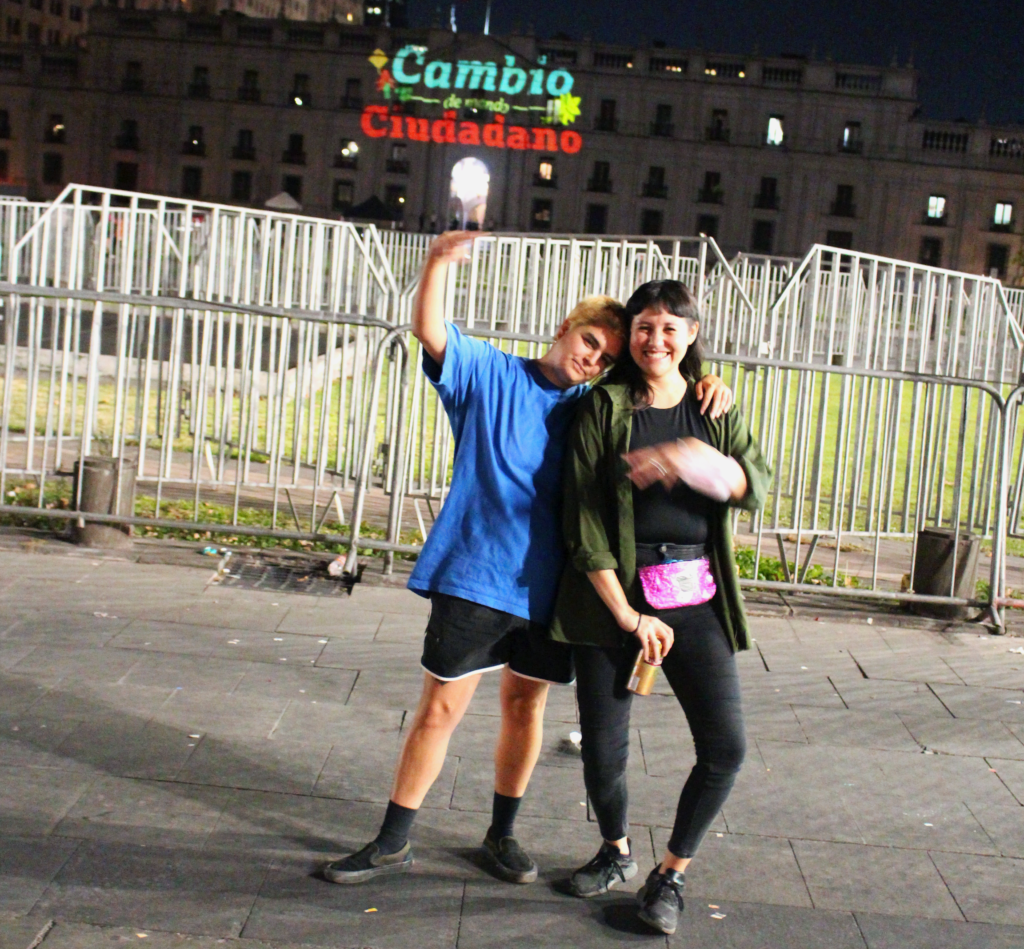
Ponti, a 29-year-old non-binary occupational therapist came to Santiago three years ago, and is originally from the South of Chile near Valdivia (in Mapuche territory). They were in front of the Presidential Palace after Boric’s first speech.
“It’s very emotional to finally hear these demands which one has been hearing for so long to be part of a presidential speech,” says Ponti. “It was scary even to speak about feminism, about transgender, about dissidents, about queerness. It even gave us shame to talk about this stuff,” they continued, “now it is a project to not to be scared to talk about it.”
“It’s very emotional to finally hear these demands which one has been hearing for so long to be part of a presidential speech”
Ponti
“There was an intersection of all the demands: feminist, dissident, trans, travesty, sex worker demands, all crossing with those about pensions, education, health,” says Dani, Ponti’s companion – a softly-spoken and gender queer 30-year-old who works in industrial design. “We are dissidents, we are queers… with the uprising it came to be something political, a transversal thing. After so much time… It’s a relief of calm. A feeling that from here we can advance.”
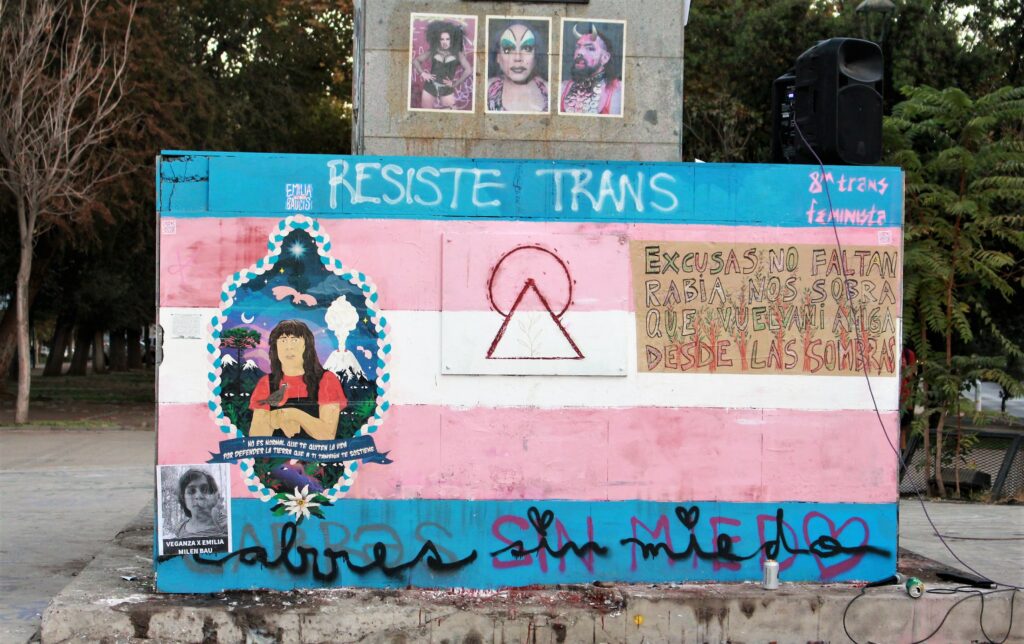
This new era is reflected in the new cabinet. With 14 women and 10 men, Boric has broken more than one gender barrier. He appointed the first teacher and openly gay Minister to the Ministry of Education, in office alongside the Minister for Sports Alexandra Benado, the first woman and lesbian to hold this post. Other elected LGBTQI+ politicians include Emilia Schneider, who is the very first transgender woman to sit in congress.
“I remember there were neighbourhood assemblies during the uprising, organised by different local groups, including the LGBTQI+ community, which helped to develop much more concrete themes and demands, such as trans healthcare for Chile, which is really needed,” says Ponti. “It doesn’t exist here, it’s very precarious.”
Alexandra
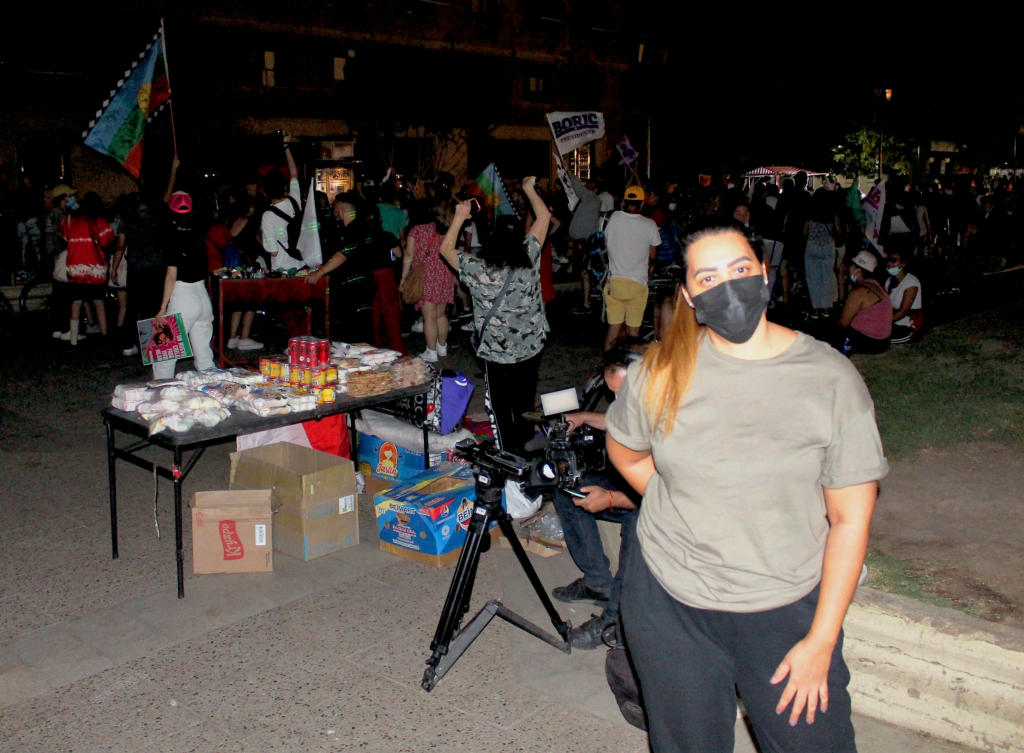
Alexandra, a 38-year-old Venezuelan woman who has lived in Santiago for the past four years, was happy, emotional, and amazed to hear Boric speak while standing amid the crowds.
“I came to the streets this evening to live in democracy. This is democracy. Something that I have not experienced in my home country for 22 years. It’s like I’m listening to the young political leaders of my country, it’s the same discourse. I hear them and I wish I could have lived this in my country.”
“Today we have a voice – which is very important. What was kept silent for the fear of being judged, now it isn’t like this…Feminism is so important in these days, because each one of us is the voice of the other. It’s collective. Honestly, us women are very kind to each other.”
“I came to the streets this evening to live in democracy. This is democracy”
Alexandra
“Chile is very sexist, very misogynist… Well you imagine – me, a brown woman, with a wide body, wide legs. One calls attention. But this doesn’t mean one should live with vulnerability on the streets. They have to respect us… that this new president is giving us a voice to continue expressing ourselves – please! It’s magnificent.”
Boric’s words on Chile’s indigenous peoples were very important for Alexandra too, especially as it was a subject she “hadn’t known much about before.” In this brave first speech, he recast the conflict in the South as one that “is not a Mapuche conflict. It is a conflict that the Chilean state is carrying out against a pueblo that has the right to exist.” This was met by roaring cheers from the crowd and shouts of “Finally! Finally! Finally!”
“Today is Day 0,” as Alexandra said, but you can already feel the tectonic shifts of change. That very day, Izkia Siches – the new Interior Minister, signed for the immediate removal of a criminal public order charge against 139 political prisoners detained by the state under the Security Law during the uprising.
“You can already feel the tectonic shifts of change”
“This government is totally young, youthful, more from the people, because, I mean, this kid comes from the university,” says Alexandra. “He is the thought of the youth – and I’m saying this and I consider myself still young!”
This new government has the trust of the people. Crowds responded in song to the speech’s conclusion with “Boric, friend, the people are with you”. This real return of hope saturated the end-of-summer Friday evening air. It filled those celebrating outside the presidential palace with a renewed energy, with a renewed belief in the future of their land and its people.
Like what you’re reading? Our groundbreaking journalism relies on the crucial support of a community of gal-dem members. We would not be able to continue to hold truth to power in this industry without them, and you can support us from £5 per month – less than a weekly coffee.
Our members get exclusive access to events, discounts from independent brands, newsletters from our editors, quarterly gifts, print magazines, and so much more!

Their anti-rape performance went viral globally. Now what?

This powerful animation commemorates the lives lost in Nigeria’s #EndSARS protests

Nadia Whittome: ‘Jeremy Hunt’s Spring Budget is a slap in the face for Britain’s workers’




